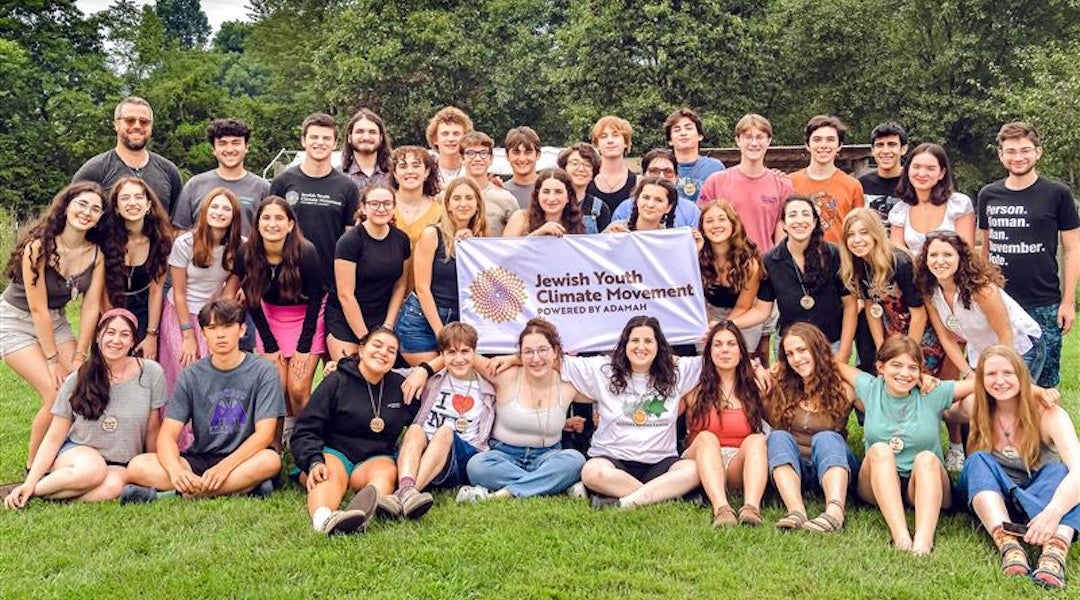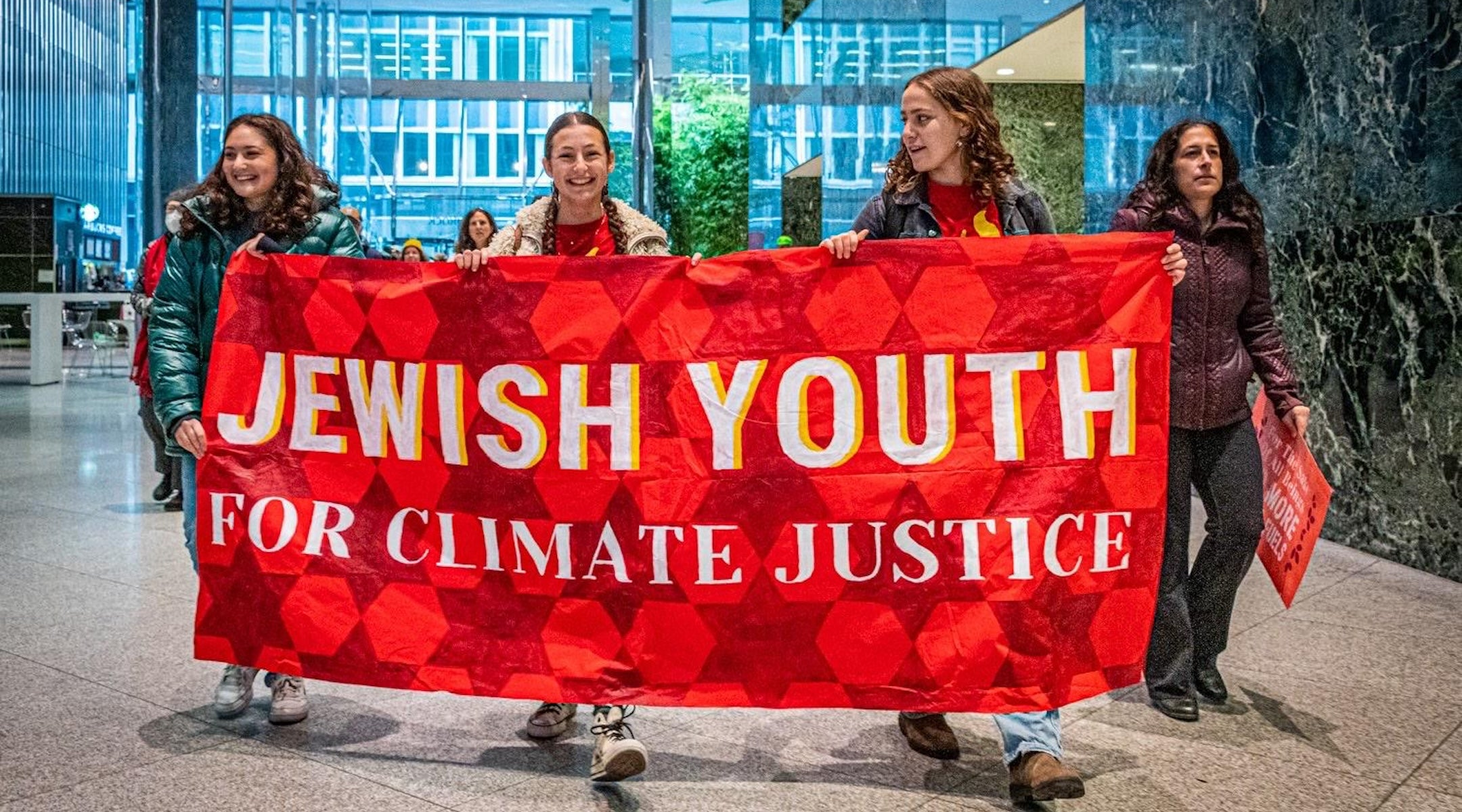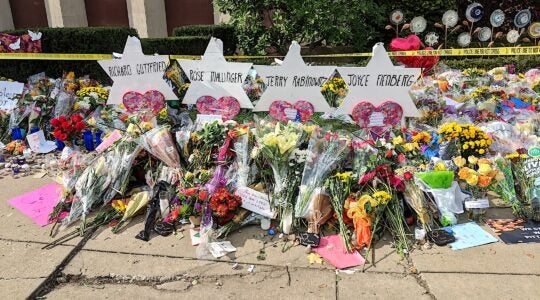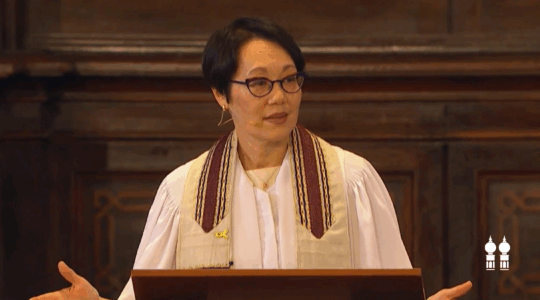This article was produced as part of JTA’s Teen Journalism Fellowship, a program that works with Jewish teens around the world to report on issues that affect their lives.
Ever since I was evacuated on a raft from my home in the pouring rain during Hurricane Harvey, I have cared about climate action. When I was 15, I learned that climate change intensified the Category Four hurricane that decimated Houston, Texas in 2017. That same year, I joined the Jewish Youth Climate Movement as a climate activist.
Now, amid my regular high school activities, I devote several hours a week to writing about climate change, and planning and attending actions demanding a better future for me, future generations and the world.
Throughout my activism, I have watched, with increasing anxiety, the climate clock tick and the world experience more and more climate change-fueled disasters. More recently, I have seen extreme hypocrisy from the federal government and major companies that backtrack on promises to lower emissions and fight the climate crisis. These decisions all but confirm that the choking wildfire smoke I face in my new home in Denver will get worse and that my activism has not been enough to single-handedly stop the crisis.
This climate neglect by the current administration starkly contrasts with the start of my activism during the Biden administration. During his term, climate change was acknowledged (a low threshold), and combating it was even one of the administration’s goals, eventually leading to the signing of the Inflation Reduction Act, an imperfect but historically large climate spending bill.
The hope that this bill instilled in youth activists is now being undone by historic levels of climate denial, gutting clean energy initiatives and research and new federal investment in fossil fuel projects. This has left my peers and me dismayed and demoralized at a time when we most need the energy to protect our communities and our generation.
Thankfully, for me and the other members of the Jewish Youth Climate Movement, having a Jewish focus to our activism can help prevent burnout and provide hope in a dark time for climate action. It’s easy for us to see climate work as inherently Jewish because our organizing seeks to repair the world and take care of the most vulnerable in our society, principles also instilled in Torah. Knowing that your faith supports and compels you to fight for a better future is motivating, and no lack of federal or corporate action can take that away.
“Taking Jewish climate action enables young people to not only fight for their local geographic communities but for the continuity of a collectivist, environmental tradition at odds with the exploitation and consumption causing climate change,” said Madeline Canfield, one of the staff advisors with JYCM who herself was a youth organizer. “This crisis requires youth activists to see their Jewish identities as two-fold: something which links them to a community to strategically mobilize and gives them texts, rituals, ideals and histories from which to draw clarity and resilience amid existential uncertainty.”
JYCM, a program of Adamah, the Jewish environmental group, does this on an explicit level, building relationships between high school members of the National Leadership Board and drawing joy from community and Jewish ritual. Meetings include time to catch up on daily life, de-stress, discuss hopeful developments in the climate world, and focus on the things that we should be grateful for in the midst of our fight for a better future. There are divrei Torah (sermons) at retreats and online meetings, connecting our work to our Jewish roots and inspiring hope, which is central to all movement planning. Our activism is loving, friendship-based, fun, and incredibly Jewishly enriching.
We are bringing that same attitude to JYCM’s newest campaign, Underwrite Earth. In partnership with other climate organizations, the initiative targets insurance companies and calls on them to stop insuring new and existing fossil fuel projects. Fossil fuel projects cannot move forward without insurance, and recently, insurance companies have shown greater willingness to respond to public pressure than the current federal government, since they rely on the public’s trust when buying their plans.
Underwrite Earth also specifically engages Jews who lead insurance companies. Part of the campaign strategy involves sending postcards to these Jewish executives pressuring them to stop insuring LNGs and to consider their faith and the climate in company decisions. Last month, in solidarity with the campaign, 110 rabbis, cantors, and clerical students sent a letter to the CEO of the insurer Chubb, making a similar Jewish appeal.
This innovative use of shared faith as a strategic tool is a reflection of the Jewish spirit of JYCM. Jews have faced setbacks in their search for safety and freedom of religion, but they adapted and kept on practicing their religion. Similarly, the climate movement has faced setbacks and has changed its strategy to adapt to the times and meet the moment. Developing these new strategies to combat the climate crisis and drawing on our history as resilient people creates hope and sparks more motivation to continue the climate fight.
Teens Hope Adelson and Liora Pelavin, who serve with me on JYCM’s Leadership Board, also draw hope from Underwrite Earth. Due to pressure from many environmental organizations, “Chubb just recently ruled out insuring the East African crude oil pipeline, which is one of the biggest oil projects in the world,” said Adelson, 17, from Orlando, Florida, “We are seeing movement, and that’s inspiring, because it shows us that the world isn’t closing in on us.”
Insurance companies “have a big financial incentive to stop insuring fossil fuel projects, because their home insurance [rates] have to go up because there are more disasters,” said Pelavin, 17, from Teaneck, New Jersey, “If they want to actually make money from insurance, they have to fight the climate crisis.”
While pressure on insurance companies may provide a boost for climate activists, decreased governmental and corporate attention to climate change is causing burnout. Finding ways to keep up motivation in the climate fight is critical to youth activists outlasting this period of lackluster focus on climate change.

JYCM teens at a retreat in 2024. (Courtesy of Adamah)
Adelson admits that living in a state whose government is highly averse to talking about or acting on climate change saps her motivation and energy for climate organizing. “It’s mind-boggling to me that my state has been hit with hurricane after hurricane, natural disaster after natural disaster, tornadoes, hail, and snow, which doesn’t happen in Florida, and yet our governor is doing nothing about it.”
When frustrated with the lack of climate action in her state and on a federal level, Adelson leans on her Jewish faith. Her bat mitzvah portion discusses pe’ah, the commandment to leave a corner of your field unharvested so those who do not have food can take from it. Adelson reminds herself of this commandment when she feels herself losing hope or motivation. She remains grateful for all that she has and considers the ways that she can use what she has to help those who might not have the same resources.
Pelavin said that “being in community is a way that I spiritually heal myself so that I can keep going in this fight… I burn out, and then I bring myself back up” by drawing strength from her community.
This cycle, she said, is fueled by “the Jewish community that I have, and the wisdom that I know.”
Climate activist Bekah Garlikov, 16, who served as a youth climate ambassador for San Mateo County, acknowledges that “activism as a whole, it’s hard. It’s really hard. The things you learn while becoming an activist are somewhat depressing and anxiety-inducing.” However, Bekah’s Jewish identity helps motivate him and avoid burnout. “Being a Jew, understanding that you have to rally behind your community, it’s a similar feeling of rallying behind climate action and making progress. The world and nature are our community, and we fight to protect them.”
My motivation comes from my community of Jewish climate activists. With them, I have attended protests, phone-banked, planned actions, established local JYCM chapters, and educated thousands of Jews intergenerationally about the climate crisis and its connection to Judaism. Throughout our work, we never lose sight of our Jewish roots, recognizing that we are supported by hundreds of generations of Jews who have cared for the earth before us. These Jewishly-rooted communal components of climate organizing help me avoid burnout and continue fighting for climate justice.
Reducing any amount of greenhouse gas emissions is a huge win and will prevent natural disasters from intensifying. If action had been taken earlier, then perhaps the climate-change-fueled hurricane that destroyed my home would not have been as extreme either. The stakes in this fight are not low; they affect everyone on Earth.
With the continued intensification of the climate crisis, Jewish teen climate activists are not slowing down. We are coming up with new strategies to reduce fossil fuel consumption despite a lack of federal government interest and are drawing on our Jewish identities, communities, experiences and families to find the motivation to continue our work and avoid burnout. There is no excuse to stop fighting for climate action. Our fight is holy work that benefits all of humanity.
JTA has documented Jewish history in real-time for over a century. Keep our journalism strong by joining us in supporting independent, award-winning reporting.






